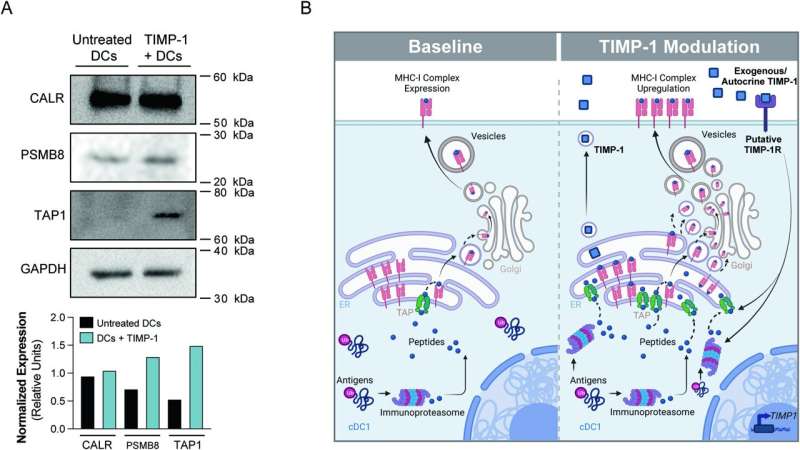This article has been reviewed according to Science X's editorial process and policies. Editors have highlighted the following attributes while ensuring the content's credibility:
fact-checked
trusted source
proofread
New and crucial role discovered for a protein in the body's immunity against cancer

Researchers at the University of Turku in Finland have found a new function for an existing protein. They discovered that TIMP-1, a protein traditionally known to prevent damage to the body's cells and tissues, plays a critical role in the immune system's defense against cancer.
The findings of the study, published in the journal Genes & Immunity, could improve the effectiveness of current cancer immunotherapies.
TIMP-1 protein is produced by dendritic cells, which are responsible for initiating immune responses and boosting the immune system's ability to recognize and destroy cancer cells. The protein enhances antitumor immunity through self-stimulation and by activating surrounding immune cells.
As a result, increasing TIMP-1 expression or targeting its negative regulators in tumors with deficient immune responses could potentially improve the effectiveness of current cancer immunotherapies.
"For patients deficient in TIMP-1 expression, our discovery helps create rational therapeutic innovations," says Carlos Rogerio Figueiredo, Docent and InFLAMES researcher at the University of Turku.
According to Figueiredo, the new findings are also relevant for fighting infections by viruses and bacteria, as the process is part of a universal mechanism that fights microorganisms and cancer in a similar fashion.
The study used samples from the Finnish Auria Biobank for clinical-oriented discoveries, which were further validated with the latest biochemical and immunological tools to propose a new molecular view of how the body fights cancer. Figueiredo thanks the patients as well as Oncologist Maria Sundvall and Pathologist Eva-Maria Birkman from Turku University Hospital for their significant contributions to this project.
"The published research shows how the reverse translational method works in practice. Traditional translational research typically starts with basic laboratory discoveries, which are later tested on patients in clinical trials. The reverse translational approach, on the other hand, starts with real-world data from patient samples to guide focused laboratory studies, thereby enhancing the likelihood of success when applied to patients," explains Figueiredo.
Figueiredo heads the Medical Immuno-Oncology Research Group (MIORG) at the Faculty of Medicine at the University of Turku, which is affiliated with the Turku Bioscience Center.
More information: Miriam Langguth et al, TIMP-1 is an activator of MHC-I expression in myeloid dendritic cells with implications for tumor immunogenicity, Genes & Immunity (2024). DOI: 10.1038/s41435-024-00274-7



















